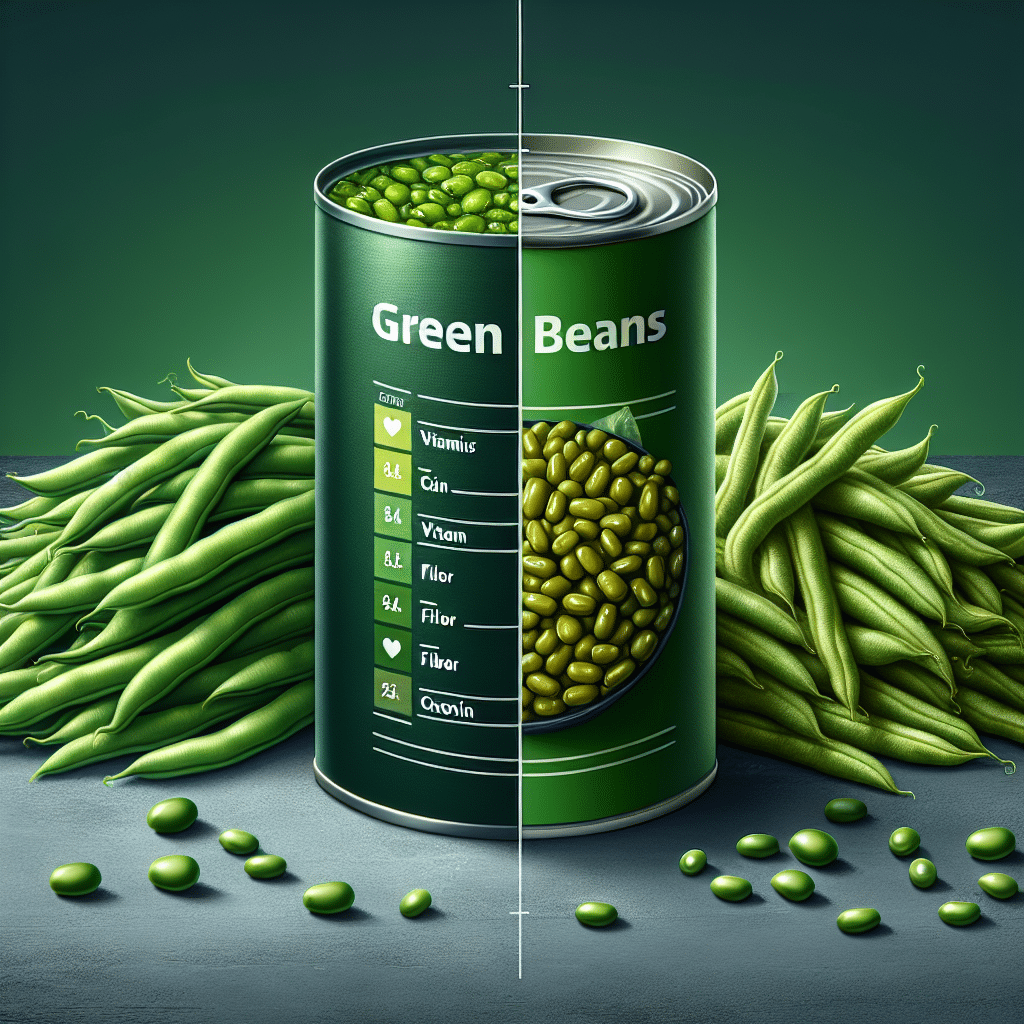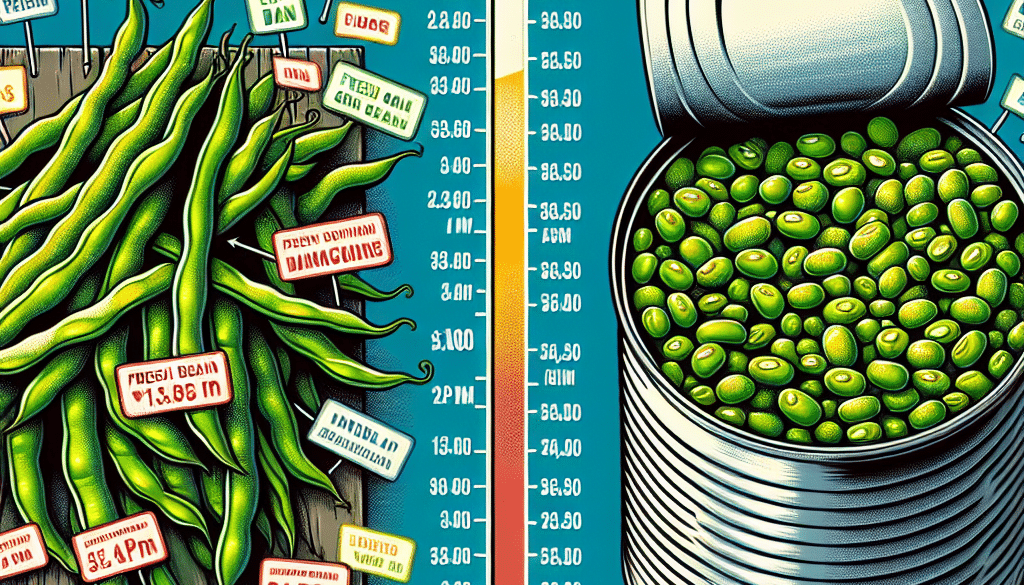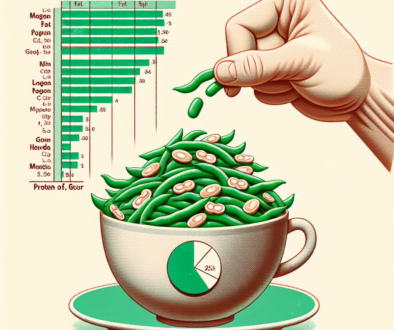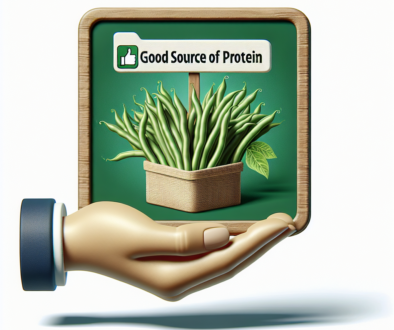Fresh Green Beans vs. Canned: Nutritional Comparison
-
Table of Contents
- Fresh Green Beans vs. Canned: Nutritional Comparison and Insights
- Introduction to Green Beans
- Nutritional Profile of Fresh Green Beans
- Nutritional Profile of Canned Green Beans
- Comparative Analysis: Fresh vs. Canned Green Beans
- Nutrient Retention
- Convenience
- Taste and Texture
- Cost and Accessibility
- Health Benefits and Potential Drawbacks
- Health Benefits
- Potential Drawbacks
- How to Choose and Use Green Beans
- Conclusion: Making the Right Choice for Your Diet
- Enhance Your Diet with ETprotein’s High-Quality Protein Products
Fresh Green Beans vs. Canned: Nutritional Comparison and Insights

Green beans, a popular vegetable enjoyed across the globe, come in various forms, including fresh, frozen, and canned. Each form offers different benefits and drawbacks, particularly when it comes to nutritional value. In this article, we will delve into a comprehensive comparison between fresh and canned green beans, examining their nutritional content, health benefits, and potential drawbacks. By the end of this article, you will have a clearer understanding of which option might be best for your dietary needs and lifestyle.
Introduction to Green Beans
Green beans, also known as string beans or snap beans, are a staple in many diets. They are a versatile vegetable that can be prepared in numerous ways, from steaming to roasting, and are often included in a variety of dishes. Green beans are not only delicious but also packed with essential nutrients, making them a healthy addition to any meal.
Nutritional Profile of Fresh Green Beans
Fresh green beans are known for their crisp texture and vibrant color. They are a rich source of vitamins, minerals, and dietary fiber. Here’s a breakdown of the key nutrients found in fresh green beans:
- Vitamin C: An antioxidant that supports the immune system.
- Vitamin K: Essential for blood clotting and bone health.
- Folate: Important for cell division and DNA synthesis.
- Fiber: Aids in digestion and helps maintain a healthy weight.
- Potassium: Regulates blood pressure and heart function.
- Iron: Necessary for the transport of oxygen in the blood.
Additionally, fresh green beans are low in calories and contain no cholesterol, making them an excellent choice for those looking to maintain or lose weight.
Nutritional Profile of Canned Green Beans
Canned green beans are a convenient alternative to fresh ones. They have a longer shelf life and are often more accessible year-round. However, the canning process can affect the nutritional content of green beans. Here’s what you can typically expect from canned green beans:
- Reduced Vitamin C: The canning process involves high heat, which can degrade water-soluble vitamins like Vitamin C.
- Added Salt: Many canned vegetables contain added sodium to enhance flavor and preserve the product.
- Altered Texture: Canned green beans are softer due to the cooking process involved in canning.
- Preservatives: Some canned green beans may contain preservatives to extend shelf life.
Despite these differences, canned green beans still retain a significant amount of nutrients and can be part of a healthy diet.
Comparative Analysis: Fresh vs. Canned Green Beans
When comparing fresh and canned green beans, several factors must be considered, including nutrient retention, convenience, taste, and cost. Here’s a detailed comparison:
Nutrient Retention
The canning process involves heating the beans to high temperatures, which can lead to nutrient loss, particularly of water-soluble vitamins like Vitamin C and B vitamins. However, some nutrients, such as fiber and minerals, remain relatively stable during canning.
Convenience
Canned green beans offer convenience as they are pre-cooked and ready to eat. They can be a time-saver for busy individuals or those without access to fresh produce. Fresh green beans require cleaning and cooking, which can be more time-consuming.
Taste and Texture
Fresh green beans typically have a better flavor and a crisper texture compared to their canned counterparts. Canned beans are often softer and can have a different taste due to the canning liquids and added preservatives.
Cost and Accessibility
Canned green beans are generally less expensive than fresh ones and are available throughout the year, regardless of the season. Fresh green beans may be more costly and are usually best when purchased in season for optimal flavor and nutrient content.
Health Benefits and Potential Drawbacks
Both fresh and canned green beans offer health benefits, such as providing essential nutrients and contributing to a balanced diet. However, there are potential drawbacks to consider:
Health Benefits
- Weight Management: Green beans are low in calories and high in fiber, making them ideal for weight management.
- Chronic Disease Prevention: The antioxidants and nutrients in green beans can help reduce the risk of chronic diseases such as heart disease and diabetes.
- Digestive Health: The dietary fiber in green beans supports healthy digestion and can prevent constipation.
Potential Drawbacks
- Sodium Content: Canned green beans often contain added salt, which can contribute to high sodium intake if not managed properly.
- Bisphenol A (BPA): Some canned foods may be lined with BPA-containing materials, which is a concern for some individuals.
- Flavor and Texture: The altered flavor and texture of canned green beans may be less appealing to some people, potentially leading to decreased consumption of vegetables.
How to Choose and Use Green Beans
When selecting green beans, whether fresh or canned, consider the following tips:
- Look for fresh green beans that are firm, crisp, and vibrant in color.
- Choose canned green beans with no added salt or preservatives when possible.
- Drain and rinse canned green beans to reduce sodium content.
- Incorporate green beans into a variety of dishes to keep meals interesting and nutritious.
Both fresh and canned green beans can be part of a healthy diet. The key is to consider your personal preferences, dietary needs, and lifestyle when making your choice.
Conclusion: Making the Right Choice for Your Diet
In conclusion, both fresh and canned green beans have their place in a balanced diet. Fresh green beans offer superior taste and texture and retain more water-soluble vitamins. Canned green beans provide convenience and accessibility, although they may contain added sodium and have a softer texture. Ultimately, the best choice depends on your individual needs, preferences, and the context of your overall diet.
By understanding the nutritional differences and considering the health benefits and potential drawbacks, you can make an informed decision that aligns with your health goals. Remember to enjoy green beans in moderation as part of a varied diet rich in fruits, vegetables, whole grains, lean proteins, and healthy fats.
Enhance Your Diet with ETprotein’s High-Quality Protein Products
If you’re looking to complement your diet with additional protein sources, consider ETprotein’s range of organic bulk vegan protein and plant proteins. Their products, including Organic rice protein, clear rice protein, pea protein, clear pea protein, pumpkin seed protein, sunflower seed protein, and mung bean protein, are designed to meet the needs of various industries and dietary preferences.
ETprotein’s offerings are characterized by a neutral taste, non-GMO, and allergen-free attributes, making them an excellent choice for those seeking to boost their protein intake with high-quality, plant-based options. Whether you’re involved in sports nutrition, weight management, dietary supplements, or simply looking for a nutritious addition to your meals, ETprotein has a solution for you.
About ETprotein:
ETprotein, a reputable protein Chinese factory manufacturer and supplier, is renowned for producing, stocking, exporting, and delivering the highest quality organic bulk vegan protein and plant proteins. They include Organic rice protein, clear rice protein, pea protein, clear pea protein, pumpkin seed protein, sunflower seed protein, mung bean protein, etc. Their offerings, characterized by a neutral taste, non-GMO, allergen-free attributes, cater to a diverse range of industries. They serve nutraceutical, pharmaceutical, cosmeceutical, veterinary, as well as food and beverage finished product distributors, traders, and manufacturers across Europe, USA, Canada, Australia, Thailand, Japan, Korea, Brazil, and Chile, among others.
ETprotein specialization includes exporting and delivering tailor-made protein powder and finished nutritional supplements. Their extensive product range covers sectors like Food and Beverage, Sports Nutrition, Weight Management, Dietary Supplements, Health and Wellness Products, and Infant Formula, ensuring comprehensive solutions to meet all your protein needs.
As a trusted company by leading global food and beverage brands and Fortune 500 companies, ETprotein reinforces China’s reputation in the global arena. For more information or to sample their products, please contact them and email sales(at)ETprotein.com today.












